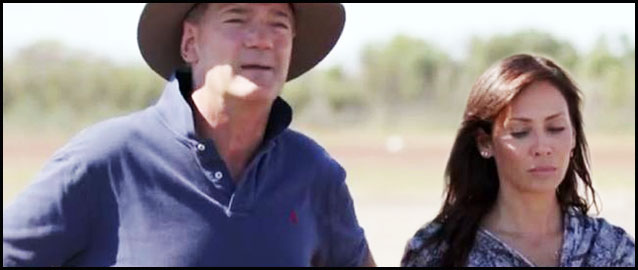765 Was the Stolen Genration really stolen?
Good news for the remaining members - some 730 or so - of the stolen generation ... the Baird government has decided their claims are worthy of compensation:
SMH: Baird government to offer reparations to Stolen Generations

This is encouraging and very welcome in view of the fact that just last night we heard - in the stunning SBS show First Contact (yesterday's blog 763) - from former One Nation parliamentarian David Oldfield ...
“Frankly it (Aboriginal Australia) should have died out like the
stone age,” Oldfield says early on. “Aboriginality is just unnecessary. It’s
not really in the best interests of Aboriginal people. It’s not good for
Aborigines to remain Aborigines. You just naturally let it die out.”
... that there has
actually been not a single case where an Australian court recognized that the
term “stolen generation” is warranted … how can this be in the face of so much
evidence?
Well, apparently it is true ... right wing, conservative nutters have their legs on firm legal ground when they totally dismiss the plight of Aboriginal children that were forcibly removed from their families. Their position is described in a document of the University of Tasmania Law Review:
"Not only is the charge of genocide unwarranted, but so is the term ‘Stolen Generations’. Aboriginal children were never removed from their families in order to put an end to Aboriginality or, indeed, to serve any improper government policy or program. The small numbers of Aboriginal child removals in the twentieth century were almost all based on traditional grounds of child welfare."
This is notwithstanding the fact that in the same document it is stated that:
The Australian practice of Indigenous child removal involved both systematic racial discrimination and genocide as defined by international law. Yet it continued to be practised as official policy long after being clearly prohibited by treaties to which Australia had voluntarily subscribed.
The Commission noted further that, although child removal may have been legally authorised, it was discriminatory and genocidal nonetheless:
The Inquiry has found that the removal of Indigenous children by compulsion, duress or undue influence was usually authorised by law, but that those laws violated fundamental common law rights which Indigenous Australians should have enjoyed equally with all other Australians.
Frankly, I find it
hard to hold back: These ratbags Keith Windschuttle (the author of the
above passage) and David Oldfield are a disgrace. They adopt an utterly amoral
position, one devoid of any ethical considerations, when they denounce
Aboriginality. But that is the policy of the Pauline Hanson One Nation party
... a bunch of unprincipled rednecks, lacking any compassion or sympathy
for their fellow human being (the un-white kind). Shame on them; what a disgusting lot of scumbags.
Read more:
University of Tasmania Law Review
This article examines reasons for lack of widespread successful litigation by members of the Stolen Generations. The term ‘Stolen Generations’ refers to Indigenous Australian children forcibly removed from their families and culture by Australian governments for racial reasons from the late 1800s to the 1970s.
Although there is continuing debate about the number of Aboriginal children removed, there is no doubt that officials forcibly removed many thousands of Aboriginal children from their parents during this time.
In its 1997 report from the National Inquiry into the Separation of Aboriginal and Torres Strait Islander Children from Their Families, Bringing Them Home, the Australian Human Rights and Equal Opportunity Commission (HEROC) declared these removals to be immoral, and in some circumstances, illegal:
The Australian practice of Indigenous child removal involved both systematic racial discrimination and genocide as defined by international law. Yet it continued to be practised as official policy long after being clearly prohibited by treaties to which Australia had voluntarily subscribed.
The Commission noted further that, although child removal may have been legally authorised, it was discriminatory and genocidal nonetheless:
The Inquiry has found that the removal of Indigenous children by compulsion, duress or undue influence was usually authorised by law, but that those laws violated fundamental common law rights which Indigenous Australians should have enjoyed equally with all other Australians.
Keith Windschuttle takes a contrary position in The Fabrication of Aboriginal History Volume 3: The Stolen Generations 1881–2008:
My conclusion is that not only is the charge of genocide unwarranted, but so is the term ‘Stolen Generations’. Aboriginal children were never removed from their families in order to put an end to Aboriginality or, indeed, to serve any improper government policy or program. The small numbers of Aboriginal child removals in the twentieth century were almost all based on traditional grounds of child welfare.
He claims that lack of widespread successful litigation by members of the Stolen Generations supports this conclusion. Put simply, he says that ‘[i]f the Stolen Generations story were true, its members should have had many victories in the courts by now’.
Although Windschuttle’s argument is unrealistic and illogical, the nature and extent of many of the impediments and disincentives facing Stolen Generations litigants are at best speculative, and warrant further analysis and empirical research. This analysis and research is urgently needed as, given the lower life expectancy of Aboriginal Australians compared to non-Indigenous Australians, many of the people concerned are nearing the end of their life.